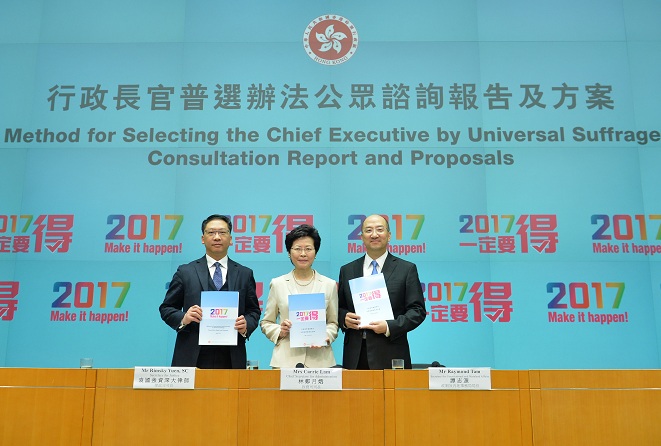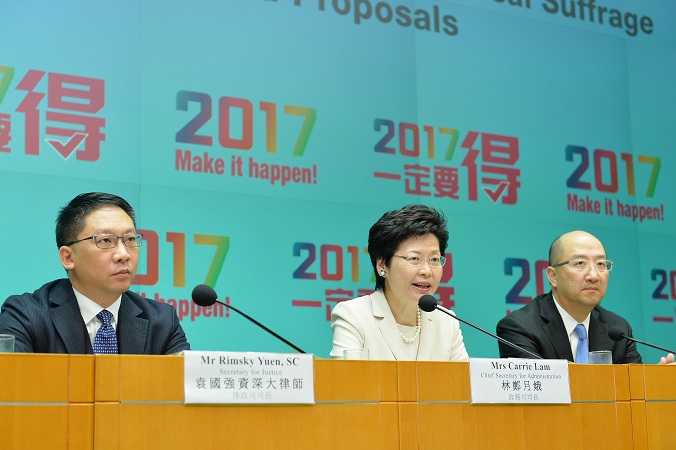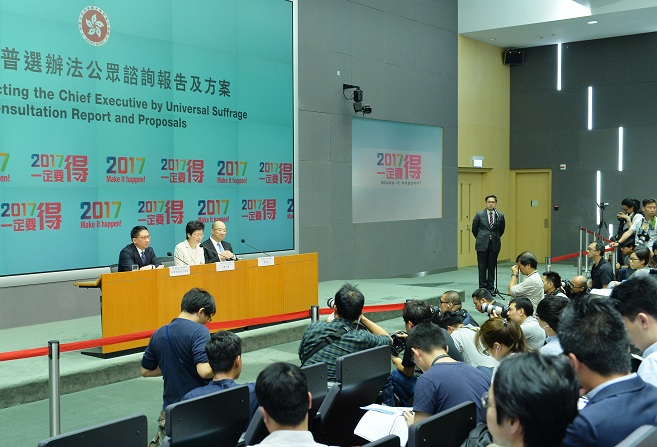| Transcript of remarks at press conference on Consultation Report and Proposals on the Method for Selecting the Chief Executive by Universal Suffrage (with photos) |
|
The Chief Secretary for Administration, Mrs Carrie Lam; the Secretary for Justice, Mr Rimsky Yuen, SC; and the Secretary for Constitutional and Mainland Affairs, Mr Raymond Tam, held a press conference on the Consultation Report and Proposals on the Method for Selecting the Chief Executive by Universal Suffrage at the Auditorium, Central Government Offices, Tamar, this afternoon (April 22). Following is the transcript of remarks at the press conference: Reporter: You say that more than half of the public support this. First, what polls are you looking at? And also, some say it's more like 40 per cent. If the upcoming opinion polls by Hong Kong's top three universities show that the public are opposed to this, what would be your response? Will you press on against public opinion? Chief Secretary for Administration: Thank you very much. When reference was made to polls indicating over half of respondents did support the electoral proposal based on the NPCSC Decision of 31st August last year, actually I was referring to polls that were in the public domain. Actually, if anyone follows the polls that have been done by various associations, it is not difficult to pick up this finding, that there's over half of public respondents in support of this recommendation. The reference to 40 per cent that you have made, I suppose it was a poll done by the Chinese University of Hong Kong. But even with that poll, if you look at it on a trend basis, because if I remember correctly, the 40 per cent was the result of a poll which has been done for the fifth time since the NPCSC recommendation made in end-August last year, and in terms of support for an electoral reform proposal based on the NPCSC Decision, that poll indicated that there was a rising trend. I think the first result was less than 30 per cent, but then gradually it rose to the 40-plus per cent that you mentioned. So I hope that this also indicated that Hong Kong people are very pragmatic. As we move closer to the actual voting on the electoral reform proposal, then they would indicate this very strong aspiration to at least get the package approved so that they will have the chance to vote for the Chief Executive election in 2017. I notice that several organisations including the three universities that you have mentioned, that they are going to organise this what they call the rolling polls between now and up to the time of voting. We will be following very closely the results of these polls. Of course, we do believe quite confidently that, being very pragmatic, the people of Hong Kong will continue to express very clearly their view, their aspiration, that they want to have universal suffrage in the year 2017. Reporter: So, Chief Secretary, you've said during your speech at the LegCo that if "one man, one vote" is achieved in 2017, the universal suffrage as prescribed in Article 45 of our Basic Law would have been attained. Does that mean that the Government doesn't think there is any need to amend the method beyond 2017, in particular the second stage of the nominating process? And also, many say that this proposal being submitted by the Government makes it very difficult, if not impossible, for pan-democrats to become official candidates. What makes you believe they would vote for a system that would effectively rule them out? Thank you. Chief Secretary for Administration: Well, on the first question, if you read the entire paragraph in my speech, that paragraph does two purposes. First is to state a fact. Universal suffrage is "one man, one vote" and hence if we did succeed to get two-thirds' majority in the Legislative Council and put in place the system to elect the next Chief Executive by universal suffrage, then we will have delivered the ultimate objective in Basic Law (Article) 45 as far as selection of Chief Executive by universal suffrage is concerned. But I went on to say that, of course, after achieving universal suffrage, the method for universal suffrage could be changed and hence you will have to look at the legal basis and the legal procedures still available within the Basic Law and the relevant NPCSC Interpretation for those changes to be effected. Basically, it is to follow the "Five-step Process" for the Chief Executive to initiate the first step and to follow through in accordance with the constitutional procedure. So I think the two have to be read in context. As far as the second question, I have just explained in response to another question that we are not designing any electoral arrangement for a particular political party. We are designing a system which we believe will be fair, open, transparent and reasonably competitive in order to give the eligible voters a sufficient choice to select the Chief Executive. But where there is room for us to make the process more competitive, more democratic, I think we have met that objective, as I've explained. Apart from incorporating the Decision and the features made in the NPCSC Decision last August, we have introduced or incorporated two features in the current proposal which we believe will make the system more competitive, i.e. the lower threshold, which will allow more people to join the race, so to speak, to become persons seeking nominations, and secondly is to give members of the 1,200 Nominating Committee the ability and a right to support each and every of the persons seeking nomination. So these two features will make the whole process more competitive, and if the system and the process is more competitive, it does imply that people from different political backgrounds should stand a higher chance of being selected or nominated to become to become Chief Executive candidates. Reporter: If the reform doesn't pass, how angry do you think Beijing will be? And do you fear there could be some retaliation measures? I'm thinking about freezing the coming Shenzhen-Hong Kong Stock Connect, or maybe Beijing would not consider Hong Kong as a headquarter for the AIIB, the Asian Infrastructure Investment Bank. Chief Secretary for Administration: Well, I think those are totally unrelated matters. Our Central Authorities have always been very supportive of Hong Kong in terms of our economic and social development. I have no doubt that that will continue as we are seeing from the Premier Li's work report as well as this intention to commence the Hong Kong-Shenzhen Stock Connect within the course of this year. But at the same time, in terms of Hong Kong's political development, the Central Authorities are also very committed to introducing universal suffrage in the selection of the Chief Executive, and that's why last August the NPCSC has given us this Decision, which actually set out the parameters for us to be able to narrow differences in Hong Kong with a view to reaching that goal. We are now at the historic opportunity in Hong Kong's constitutional development and I think the Central Authorities will be very gratified to see us delivering universal suffrage in the selection of the Chief Executive in 2017. Reporter: You talk a lot about the procedure - in fact, the procedures on the cover – but not much about the make-up. It's one thing to enter a contest as a nominee and quite another to come out of it as a candidate. So isn't it reasonable, given the composition and make-up of the nomination committee, that people of a pan-democratic persuasion would feel that they would not be likely to become a candidate? And given the composition and make-up, isn't that also likely that what you would end up at the end is with two or three people who are running in a beauty contest with no real significant difference among them on key matters of policy? Chief Secretary for Administration: The sort of composition of the 1,200(-member) Nominating Committee is really to meet the objective of having a broad representation of different sectors in society so that whoever's going to be selected as the Chief Executive will be able to represent cross-sectoral interests. This is point number one. Point number two is the Nominating Committee that is going to be formed to nominate candidates for the Chief Executive actually has yet to be formed. It will only be formed by the end of next year, and there's always every opportunity for individuals, eligible members coming from across the political spectrum, to try to get themselves onto the Nominating Committee, because it comprises four main sectors with professionals, with social services people, business people and political people. For the sake of argument, in the fourth sector, where there are over a hundred seats in the Nominating Committee for District Council representatives, it is all open for members from different political parties to gain entry into the District Councils through the coming District Council elections so that they may have a chance to be represented in the Nominating Committee and hence they have a chance to nominate candidates of their choice to become candidates in the Chief Executive election. Reporter: My last point, which I may not have made clear, is, in the end, given the composition and the make-up, that it's only 1,200 people and we know the subsectors that they come from. Is it not a reasonable concern for people to have that they will end up with two or three choices for whom it's a beauty or personality contest, but that there would be no real dime's worth of difference among them on issues of substance? Chief Secretary for Administration: Well, I don't really think that in a competition for the position of Chief Executive you will have candidates who are identical in all respects. We have seen it in the last election for the Chief Executive that in the various aspects of governance, whether it is in political development, socio-economic development, the candidates will have their own manifesto quite distinct from one another. And secondly, I have explained at length that in designing this electoral reform proposal, we have tried to stretch the room available in order to inject more competition in the whole process, which means that there will be a higher chance for people from different political backgrounds to try to get themselves onto the candidates for the Chief Executive election. So much would depend on how this whole nominating process is to take place, and as far as we are concerned, I think we have come up with a package which has struck the right balance between the various sectors and different interests in society, which I would like to recommend to the people of Hong Kong. Thank you very much. Reporter: As you mentioned, we will have to rely on local legislation if we are facing three final candidates or we have two candidates with no less than 601 votes from the Nominating Committee. You still haven't disclosed the details of this, and do you think that it's unfair to ask pan-democrats to accept a proposal which you don't even know the details of such local legislation? Chief Secretary for Administration: Well, first of all, according to the NPCSC Decision, the Chief Executive candidates have to obtain over half of support of the Nominating Committee members. That is 601 and over. And if there are three candidates who all manage to pass this threshold, then all the three persons seeking nomination will become candidates in the Chief Executive election. If there are more than three, say if there are four persons seeking nomination who all manage to pass this threshold of over half of the Nominating Committee, I think I have said in my speech then it will be the first three who have obtained the highest number of nominations from the Nominating Committee who will become the candidates. The matters that will be left to the local legislation are really the situation when there is no single person seeking nomination who manages to get over half or just one, which would not be able to meet the "two-to-three" requirement as laid down in the NPCSC Decision, or a rare situation when the number three and the number four in terms of getting the number of nominations, they are of equal nominations. Then we have to find a way in local legislation to decide how to deal with that sort of situation. (Please also refer to the Chinese portion of the transcript.) Ends/Wednesday, April 22, 2015
Press conference on Consultation Report and Proposals on the Method for Selecting the Chief Executive by Universal Suffrage (1) The Chief Secretary for Administration, Mrs Carrie Lam (centre); the Secretary for Justice, Mr Rimsky Yuen, SC (left); and the Secretary for Constitutional and Mainland Affairs, Mr Raymond Tam (right), hold a press conference on the Consultation Report and Proposals on the Method for Selecting the Chief Executive by Universal Suffrage at the Central Government Offices this afternoon (April 22).
Press conference on Consultation Report and Proposals on the Method for Selecting the Chief Executive by Universal Suffrage (2) Mrs Lam (centre) speaks at the press conference.
Press conference on Consultation Report and Proposals on the Method for Selecting the Chief Executive by Universal Suffrage (3) Mrs Lam (centre) responds to a question at the press conference. |


